Despite the
central status of the word in the language system and the fact that
speakers have no difficulty in identifying words in speech it is very
difficult to give a satisfactory definition
of
the word. Many attempts have been made to this effect but still there
is no satisfying and universally accepted word definition. This
difficulty is conditioned by word’s complexity, as word is
characterized by many aspects and properties, such as phonological,
morphological, semantic, syntactic, pragmatic ones.
The
attempts to define word proceeded either from one particular
criterion or their combinations. Definitions proceeding from a
phonological
criterion
were offered by Ch. Hocket [Hocket 1978: 166] and P.S. Kuznetsov
[Кузнецов
1964: 7] who claimed that word is any segment of a sentence (Hocket)
or a sequence of sounds (Kuznetsov) which can be separated by pauses
of any length. Such definitions point out at the outer form of the
word, the possibility to single it out between the pauses in actual
speech, but do not disclose its inner faculties, the word’s content
– its meaning.
Purely
semantic
criteria
of
word definition cannot be considered sufficient as well. For instance
St. Ullmann’s definition is based on a semantic criterion: “Words
are meaningful segments of connected discourse”. [Ullmann 1959:
30]. Not only words are meaningful units but also morphemes and
prosodic components of discourse: pauses, intonation, etc. Word
cannot be defined as a unit of the language expressing a particular
concept or notion, although word is related to concept which will be
pointed out later (chapter 2). Besides, concepts are expressed not
only by words but also word combinations, phrases and sentences.
Concept is a category of cognition and it is impossible to establish
a one-to-one correspondence between word and concept.
A.H.Gardiner
based his definition on the semantic-phonological approach: “A word
is an articulate sound-system in its aspect of denoting something
which is spoken about” [quoted from Arnold 1973: 26]. The word has
been syntactically defined as: “A word is the minimum sentence”
by H.Sweet and much later by L.Bloomfield as “a minimum free form”
[Bloomfield 1933: 187].
There were
attempts to combine the semantic, phonological and grammatical
criteria: The definitions by the Czech linguist B. Trnk “Word is a
minimum unit of meaning realized by a definite sequence of phonemes
and capable of mobility within a sentence” [1964: 201] and the
eminent French linguist A.Meillet “A word is defined by the
association of a particular meaning with a particular group of sounds
capable of a particular grammatical employment” [1926: 30] serve
as examples. Despite the fact that the above definitions embrace
various aspects of the word, they were objects of criticism because
(1) not every word is capable of positional mobility, for instance,
articles, prepositions, particles cannot move freely within a
sentence; (2) the definitions do not distinguish between a word and a
word combination. As I.V.Arnold puts it “not only child,
but a
pretty child as
well are combinations of a particular meaning with a particular group
of sounds capable of a particular grammatical employment” [1973:
26].
The word
definitions offered by Soviet/Russian linguists are based on the
theory of signs and modern semantic approaches (see ch.2). For
instance, the definition offered by O.S.Akhmanova runs as folliows:
“Word is the smallest unit of the language functioning within the
sentence, which directly corresponds to the object of thought
(referent) and is a generalized reverberation of a certain ‘slice’,
‘piece’ of objective reality – and by immediately referring to
it names the thing meant”.
In English
and other analytical languages there exist the so-called analytical
forms of certain parts of speech, such as verbs, e.g. have
finished, didn’t go, is reading, etc.,
comparative and superlative degrees of adjectives: more
interesting, most sincerely.
Such words possess certain structural separateness.
Summing
up our review of different definitions we come to the conclusion that
they are bound to be strongly dependent upon the line of approach,
the aim the scholar has in view. For a comprehensive word theory a
description seems more appropriate than a definition.
All
that was said about the word can be summed up as follows. The word is
a linguistic sign. It represents a group of sounds possessing a
meaning, susceptible to grammatical employment and characterized by
formal and semantic unity.
Соседние файлы в предмете [НЕСОРТИРОВАННОЕ]
- #
- #
- #
- #
- #
- #
- #
- #
- #
- #
- #
- Размер: 2.6 Mегабайта
- Количество слайдов: 89
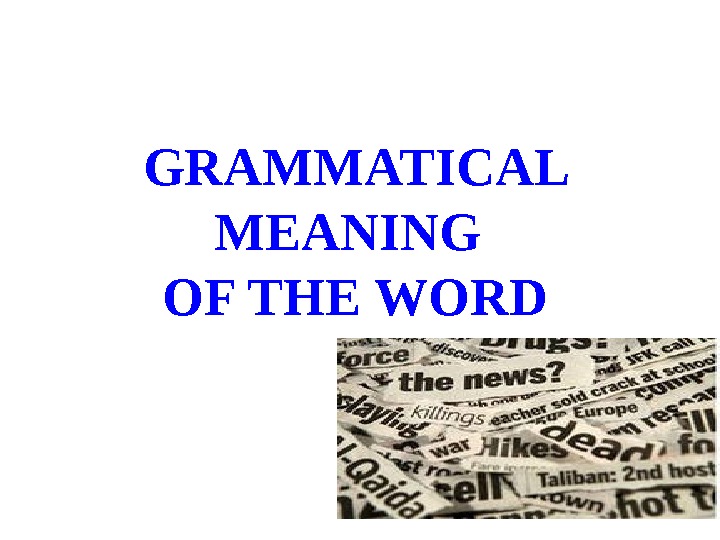

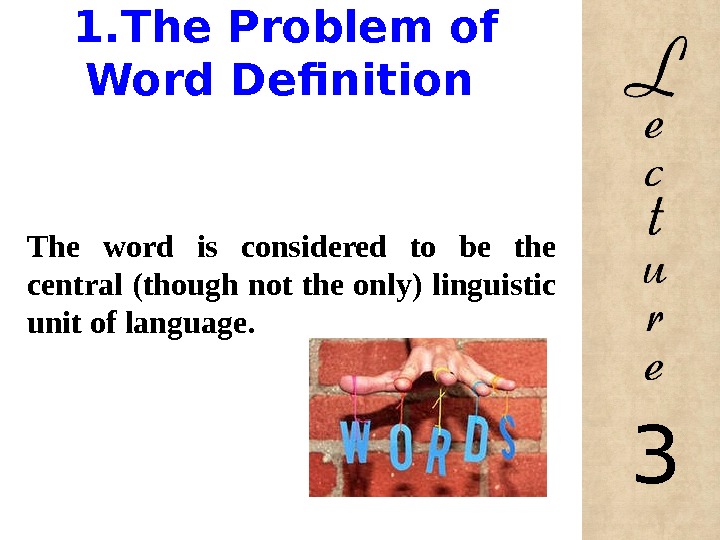
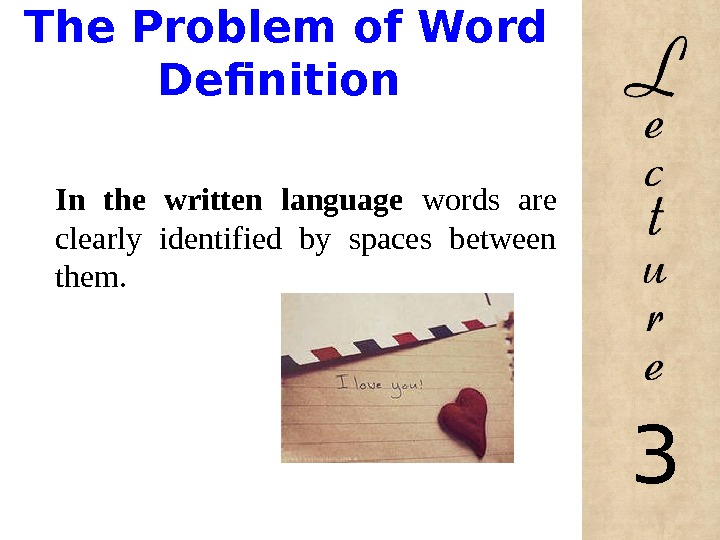
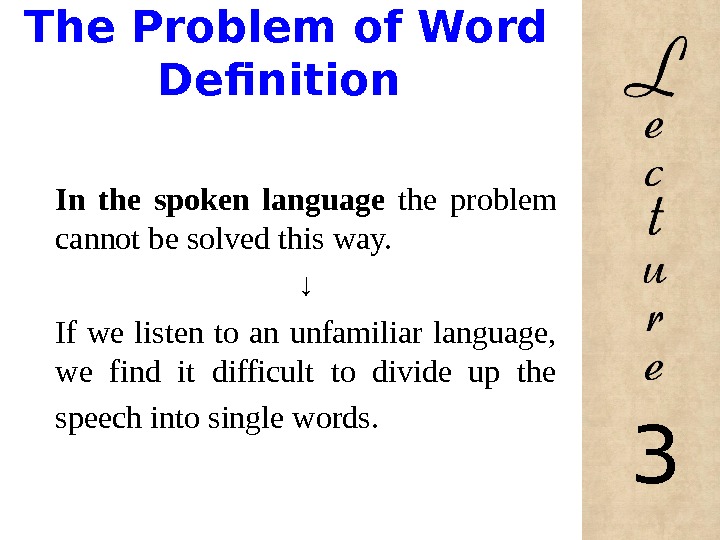
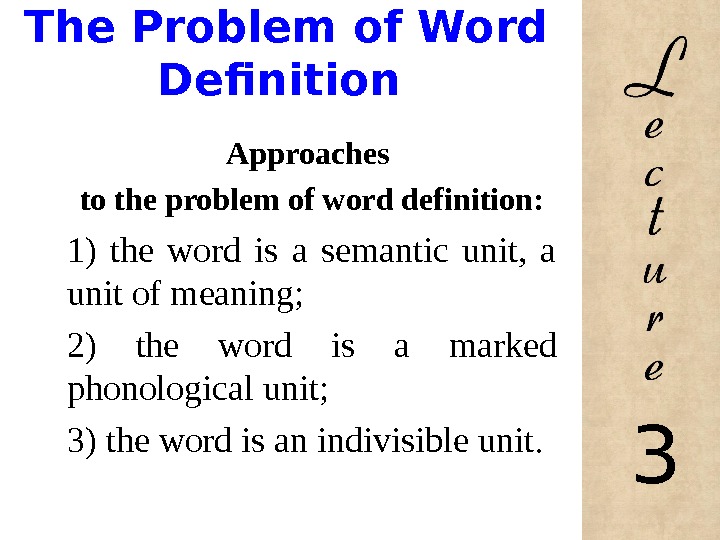
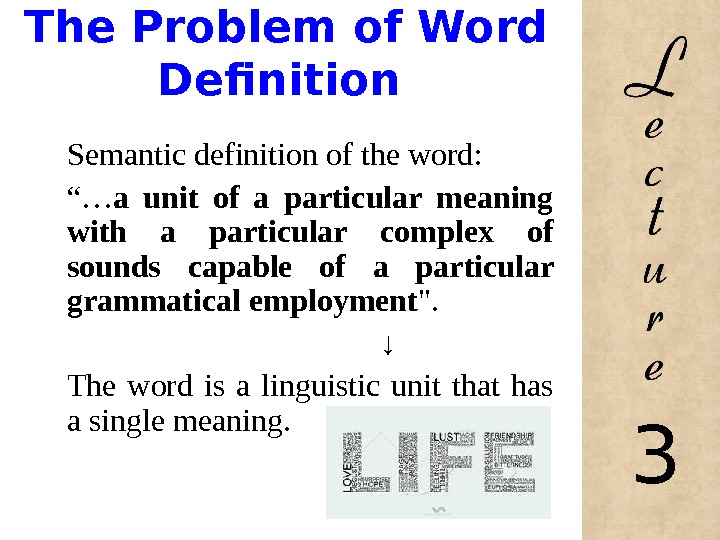
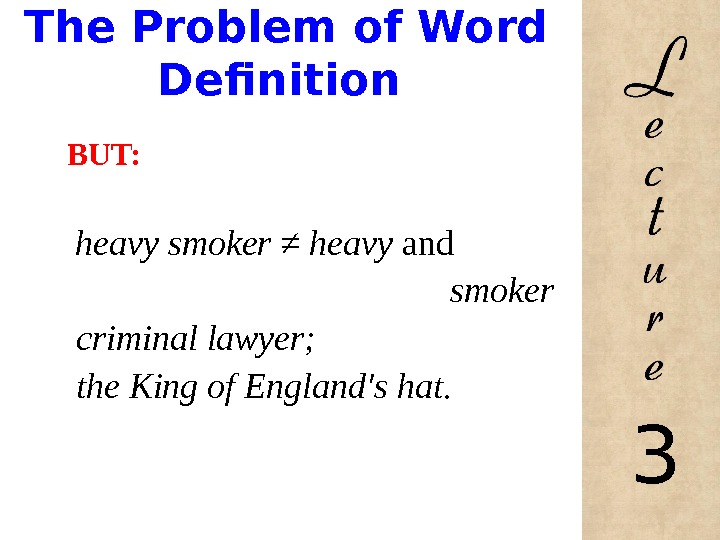


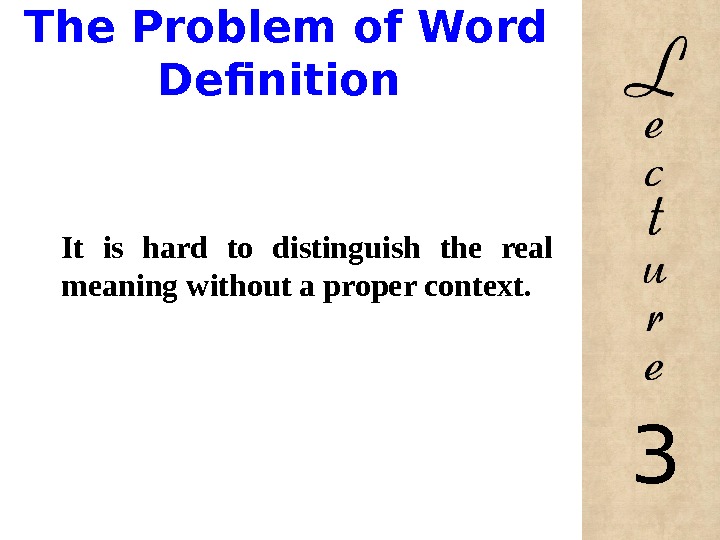

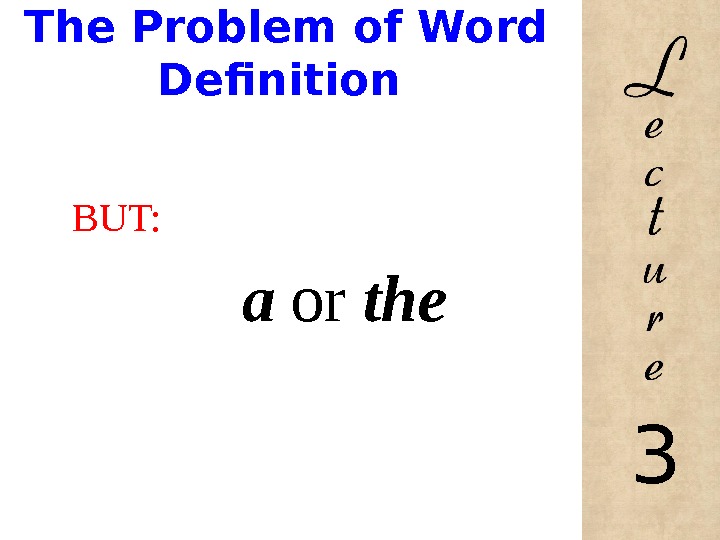
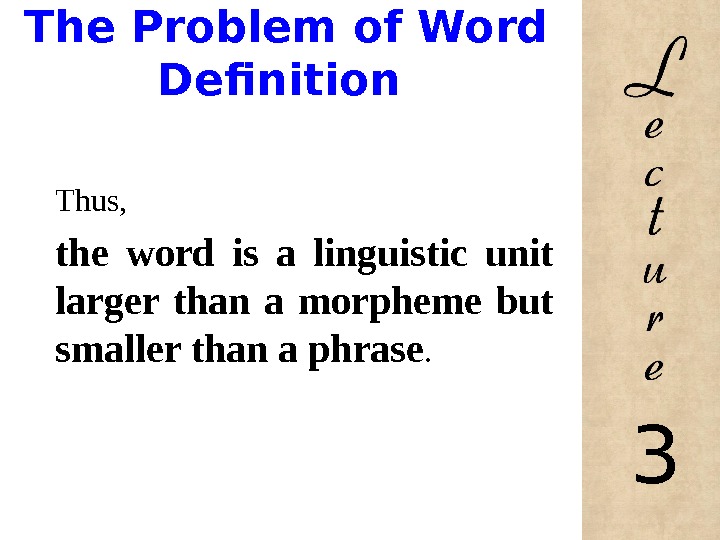
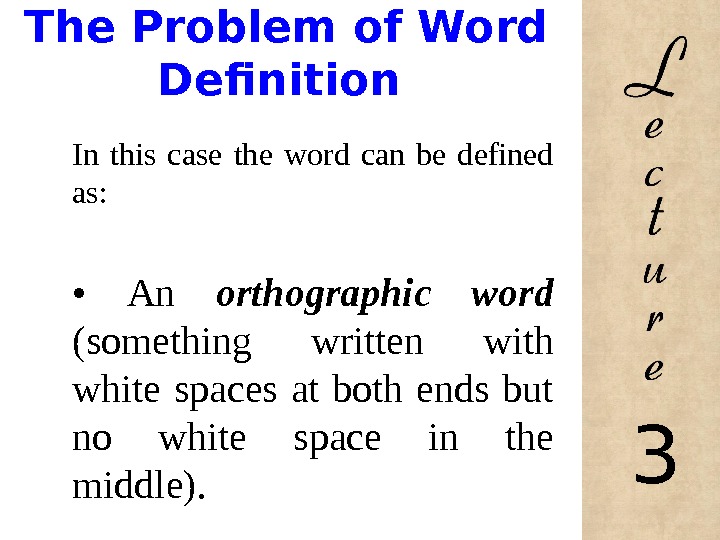

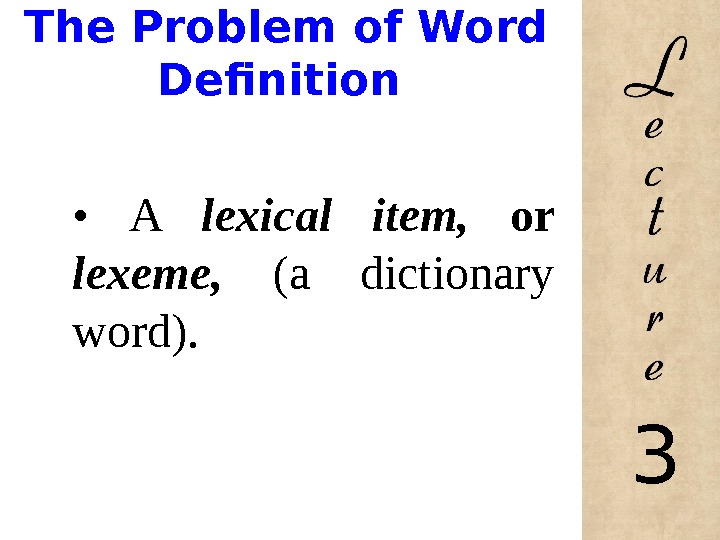

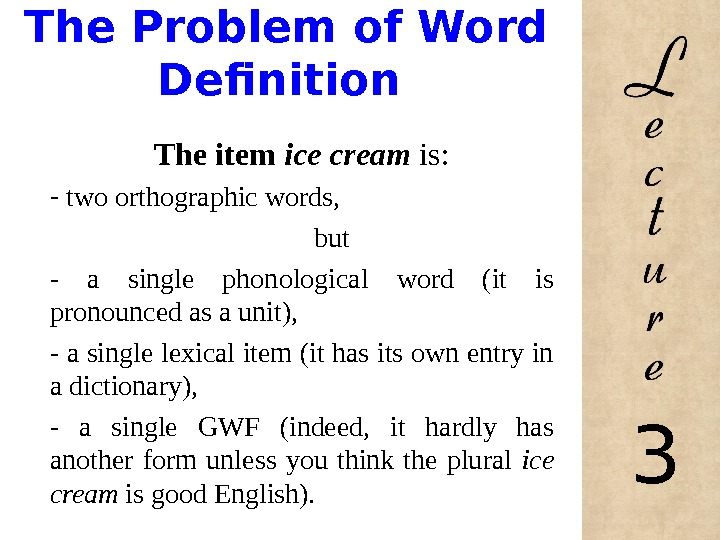
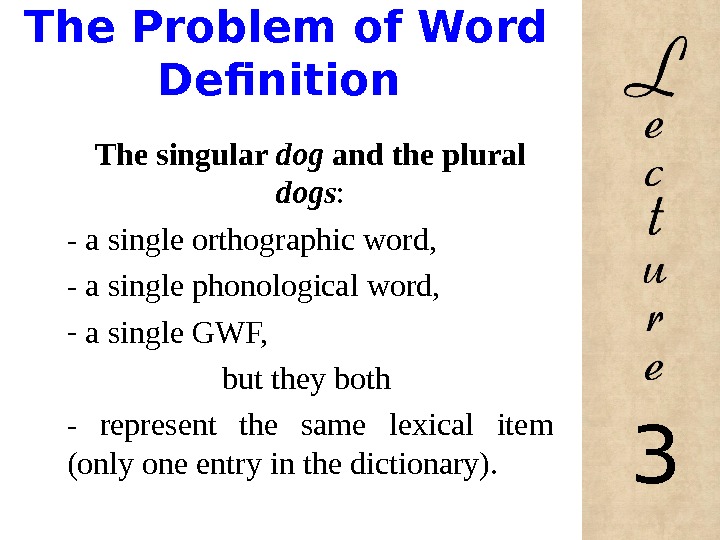
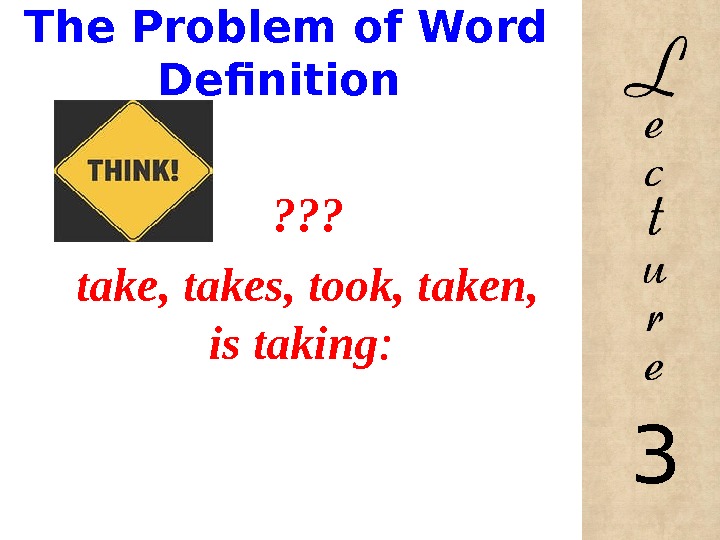
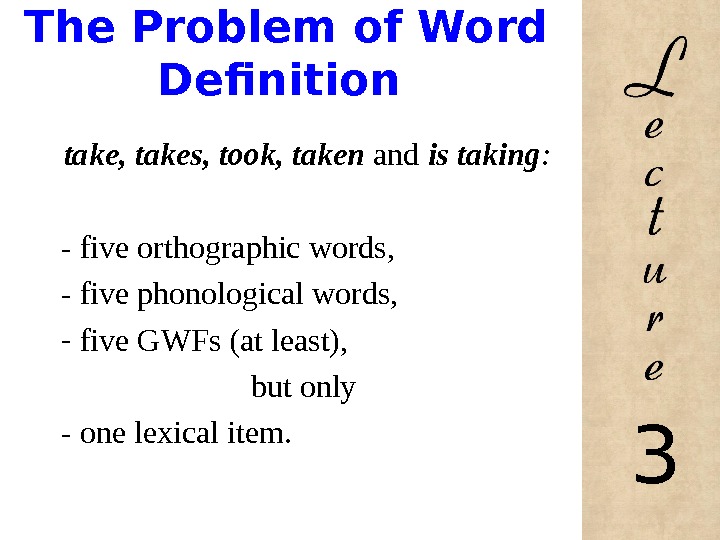
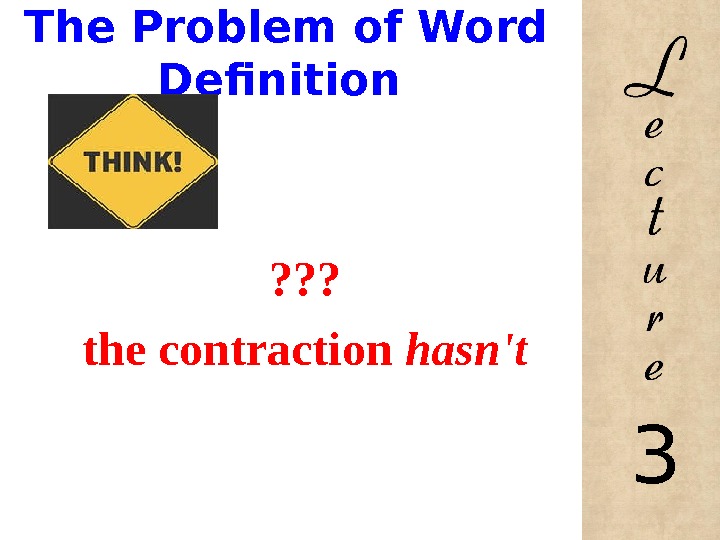

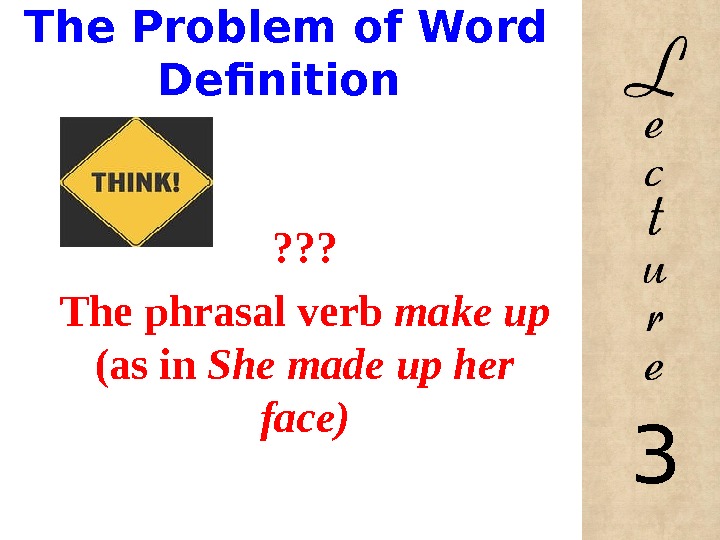
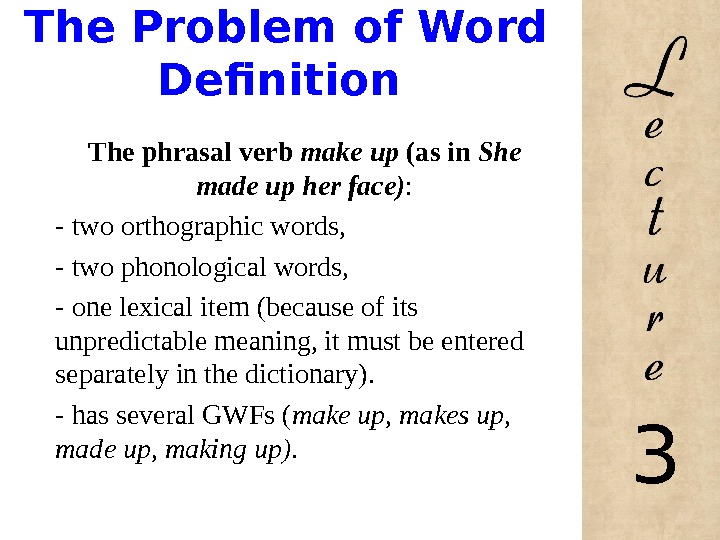

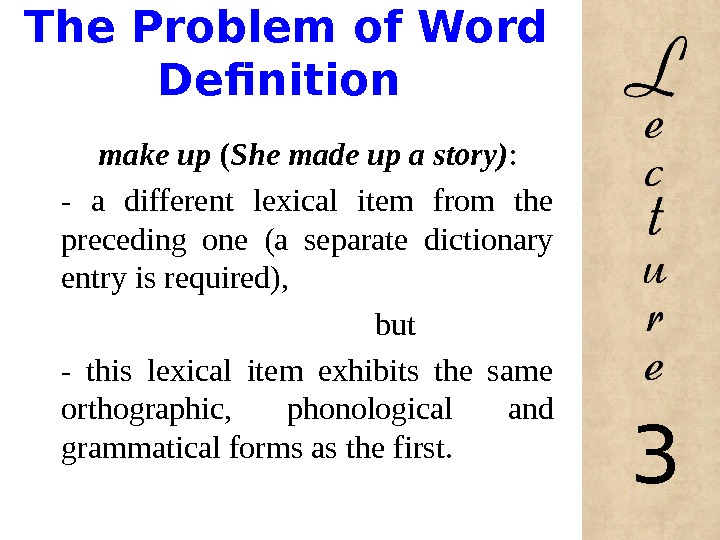
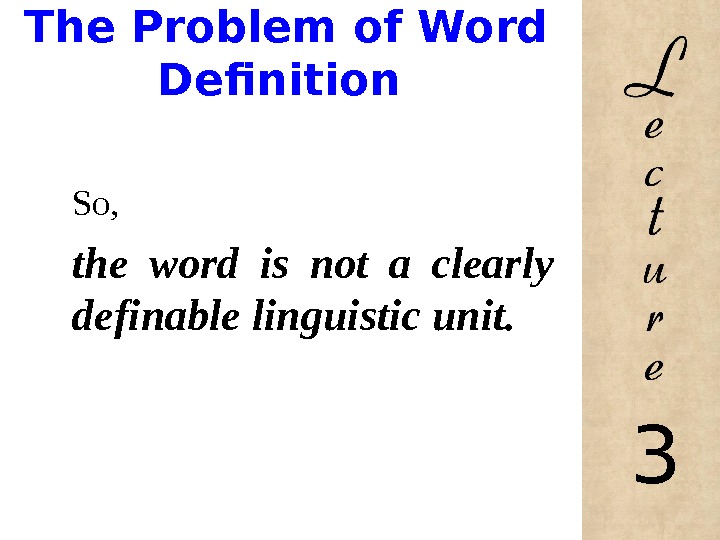
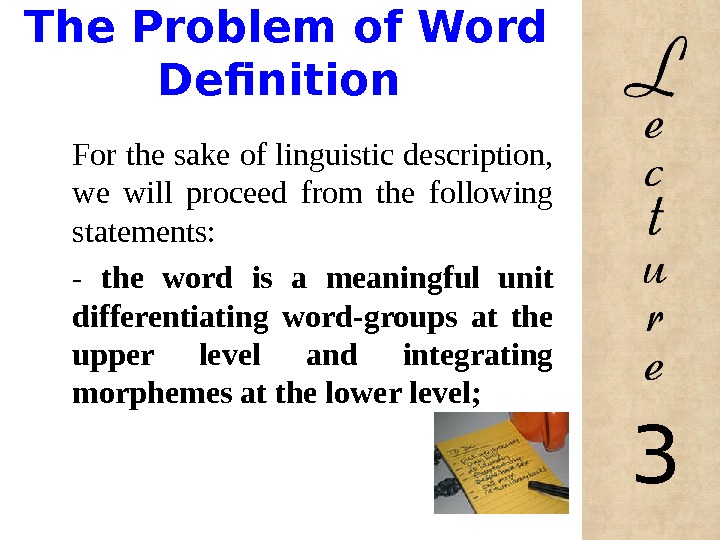
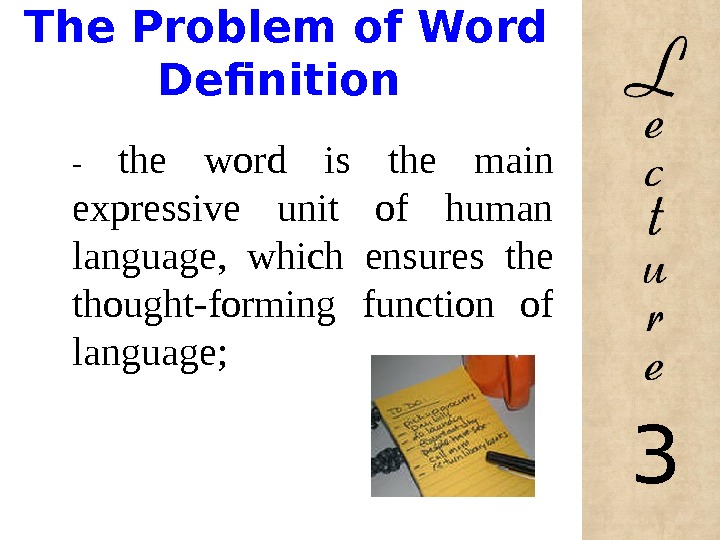
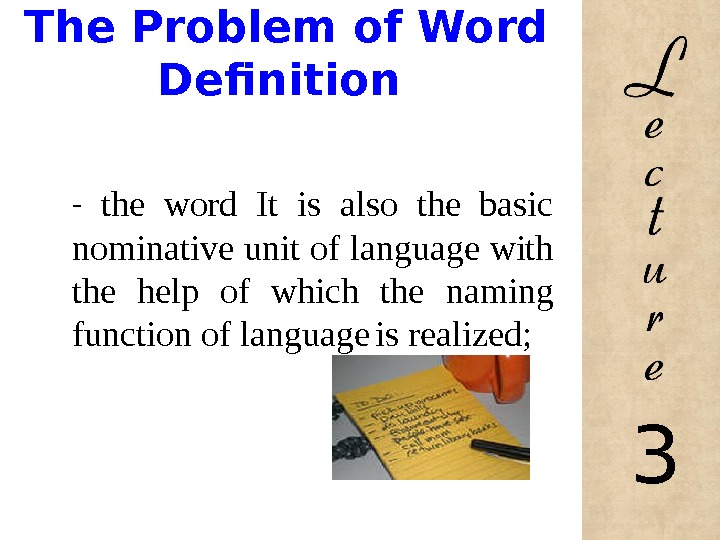
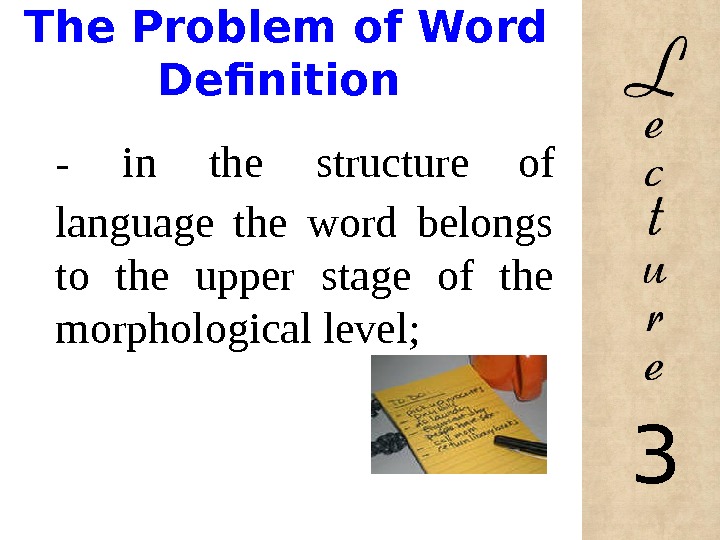
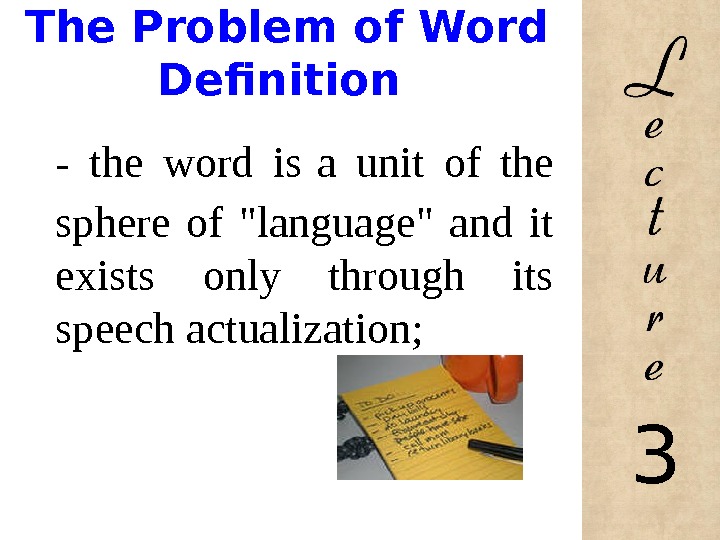
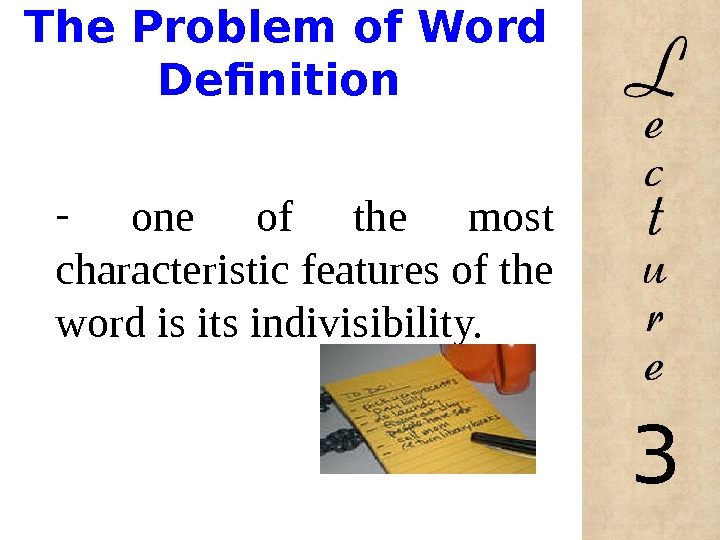
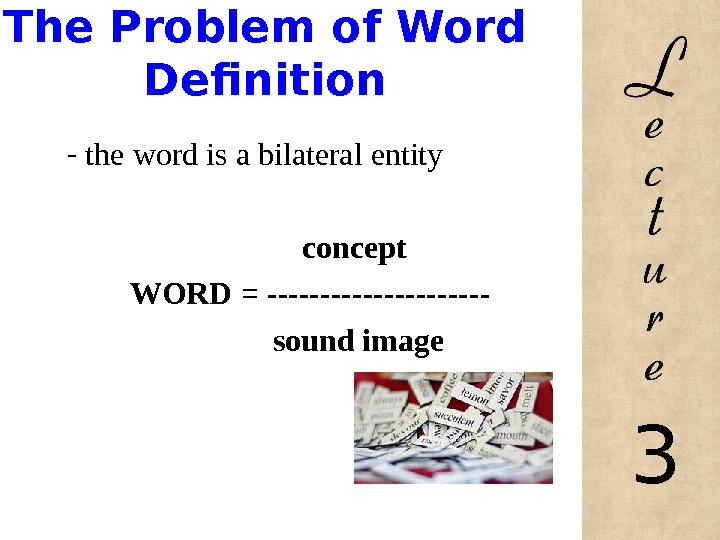
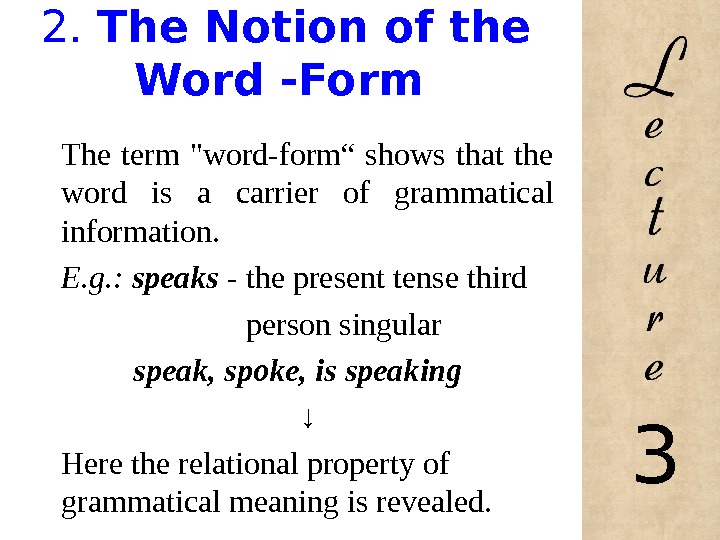

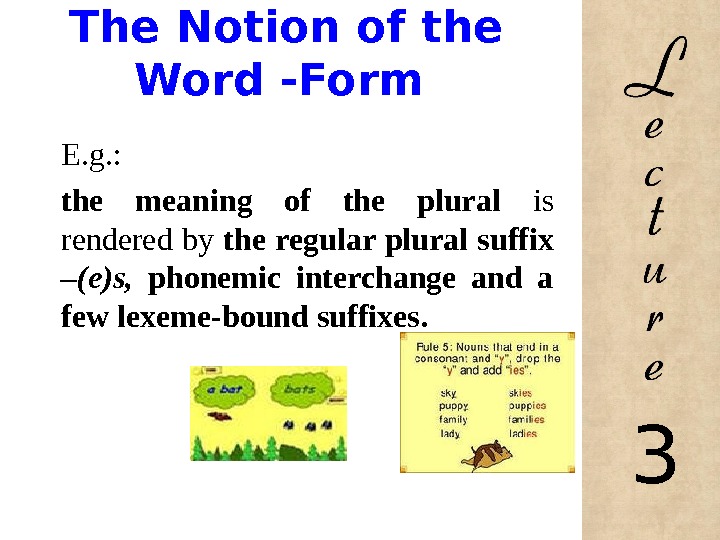

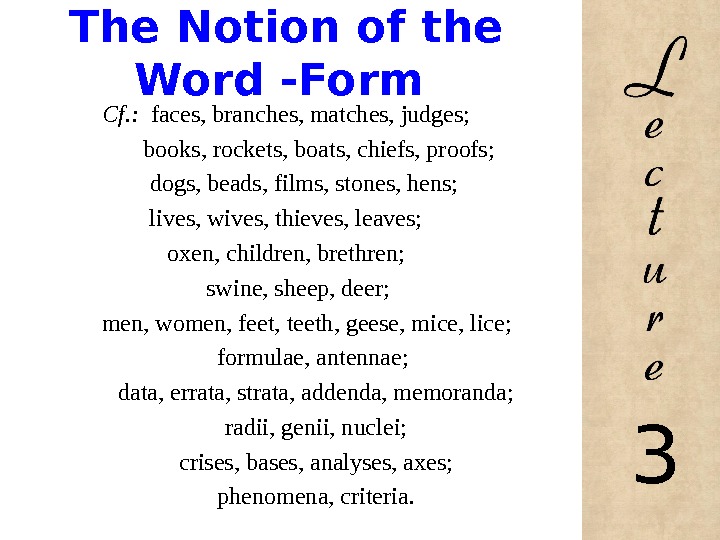
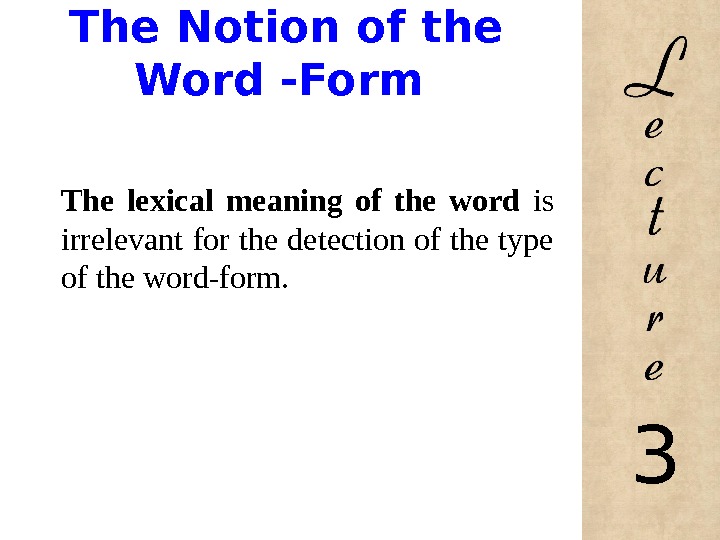

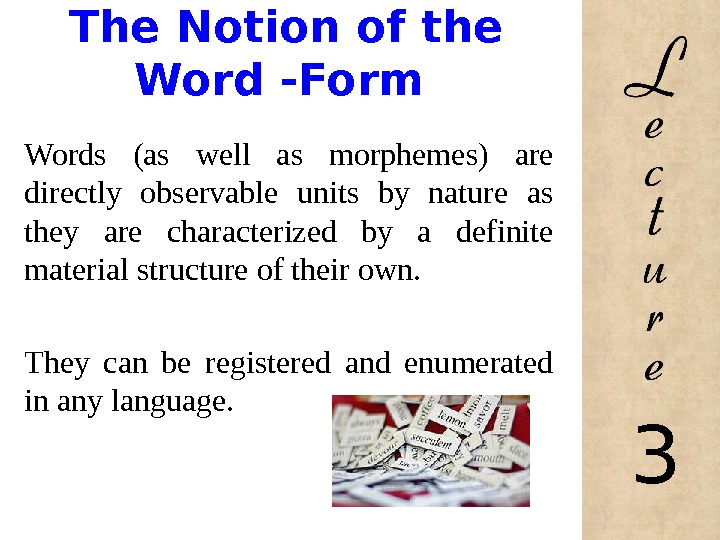
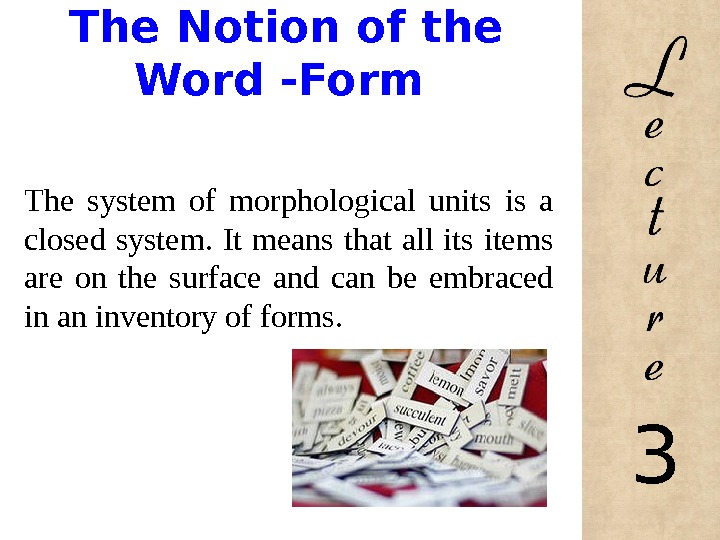
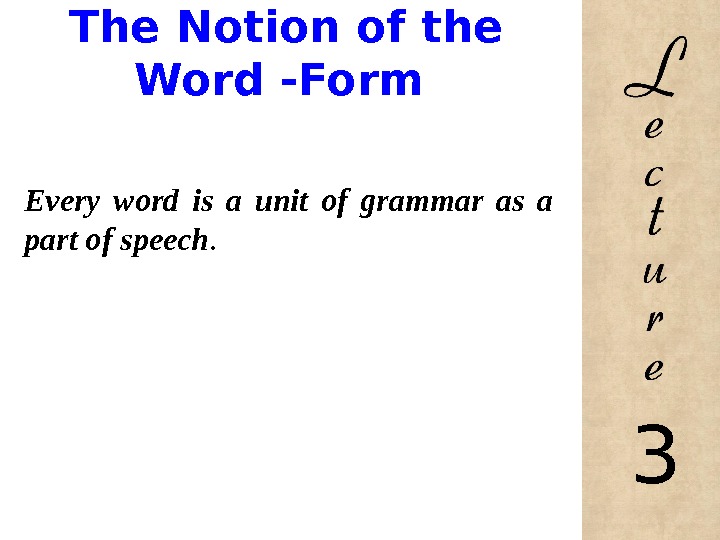
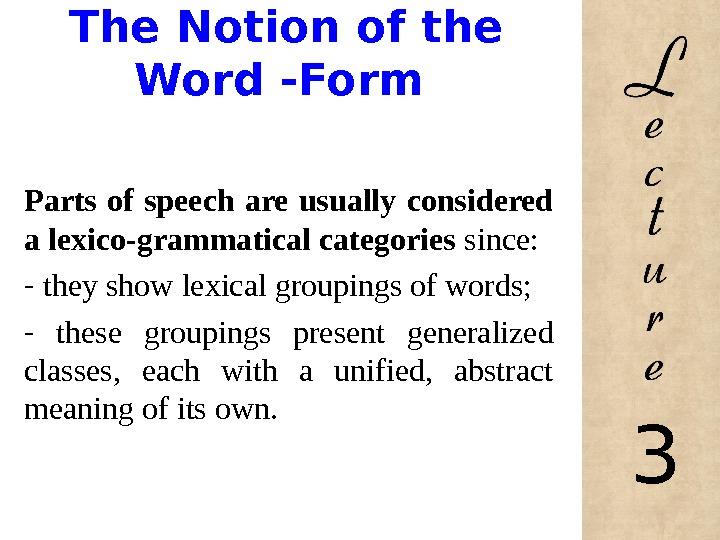
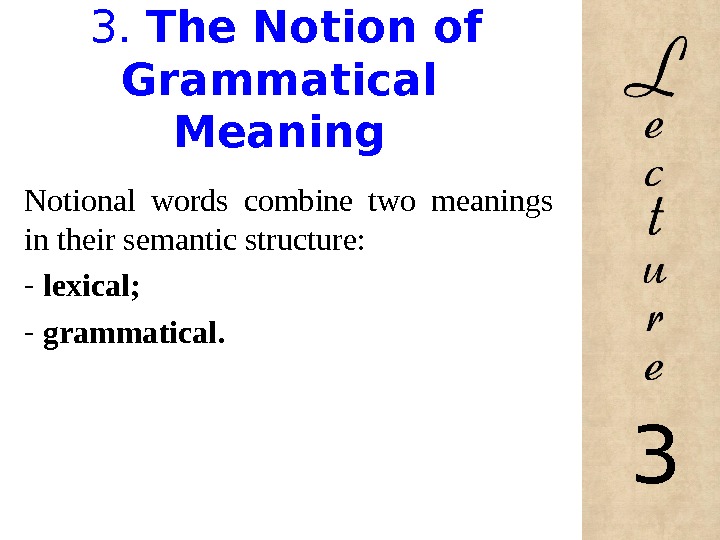

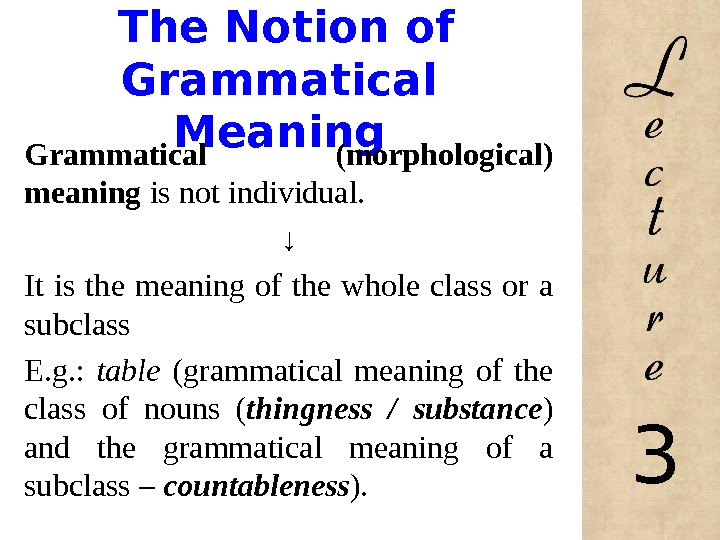
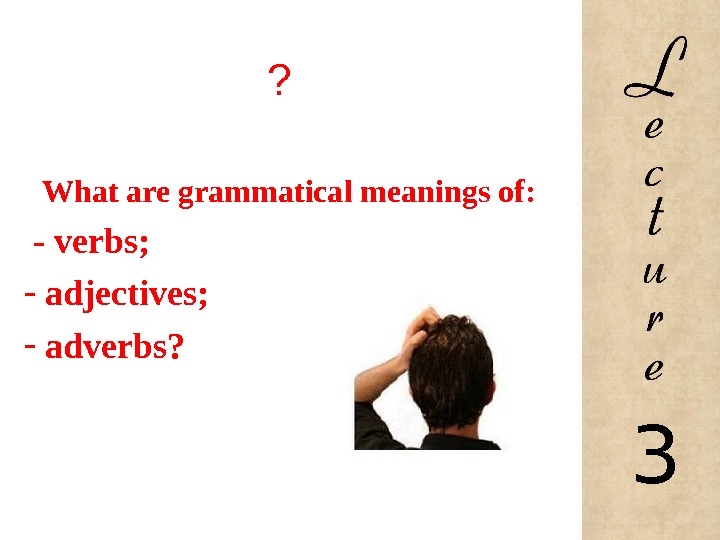
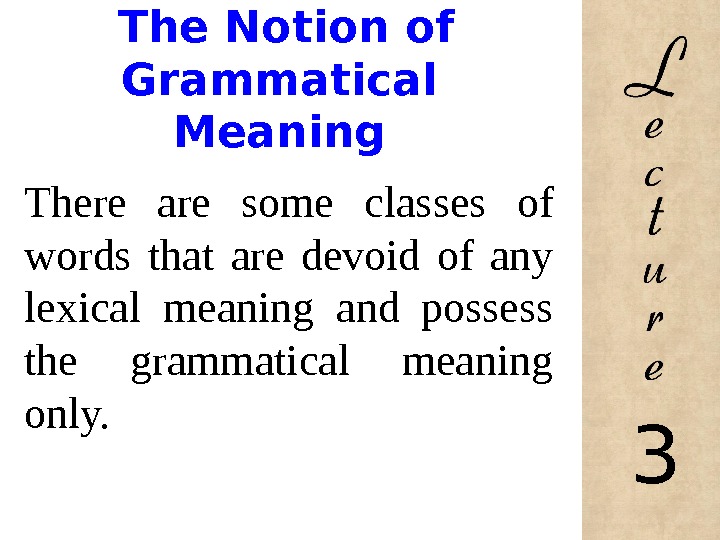
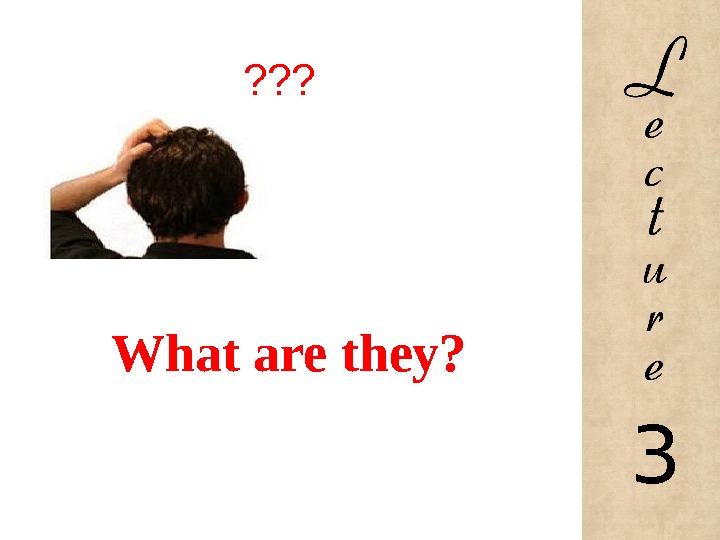
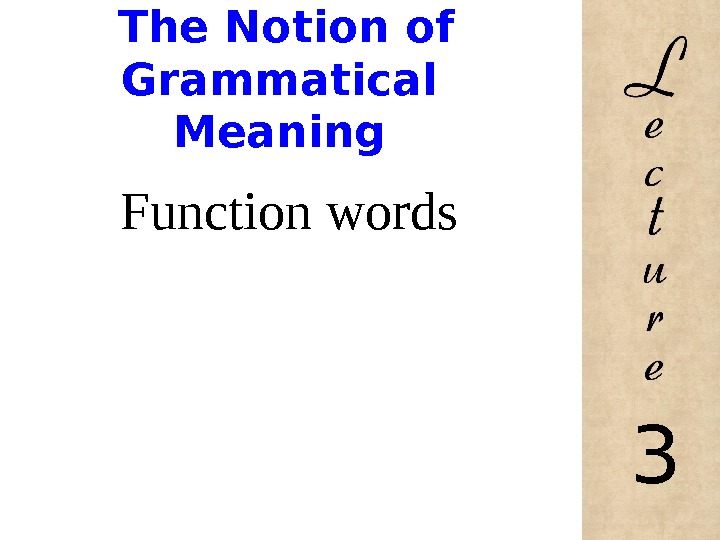

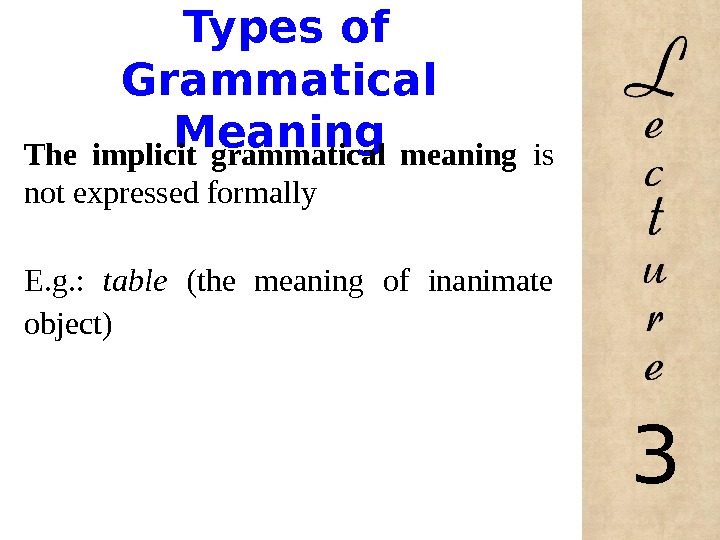
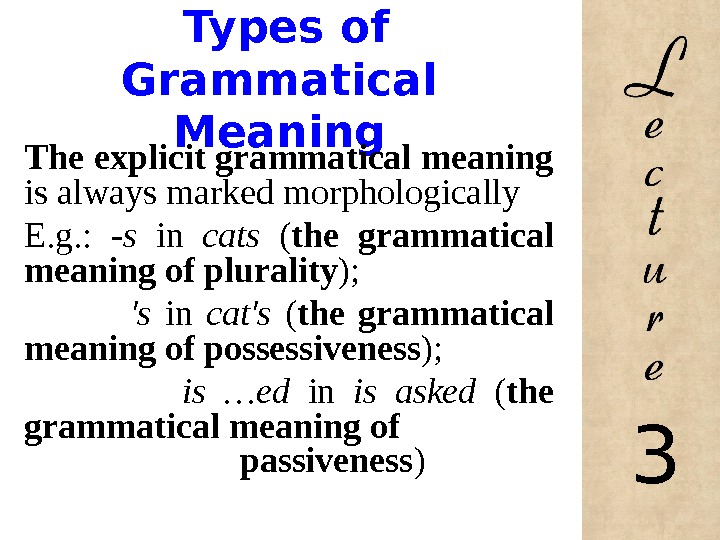

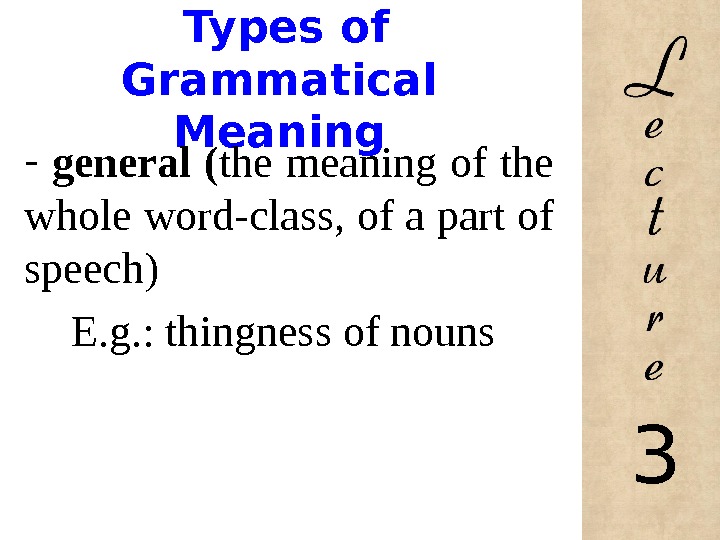
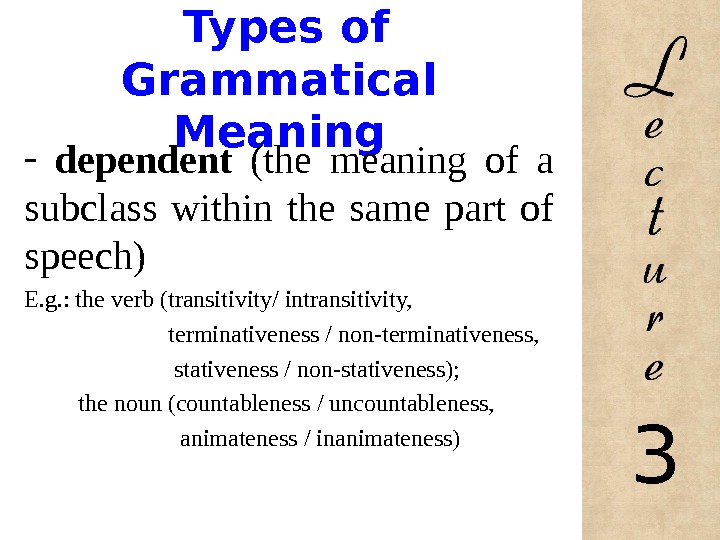
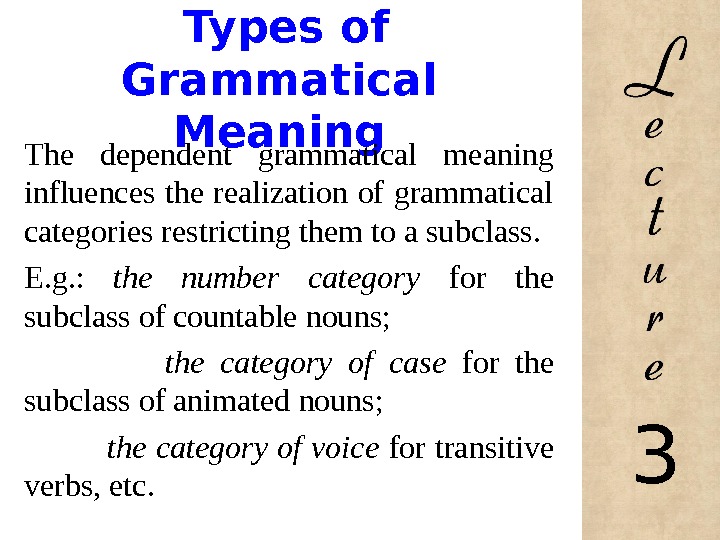

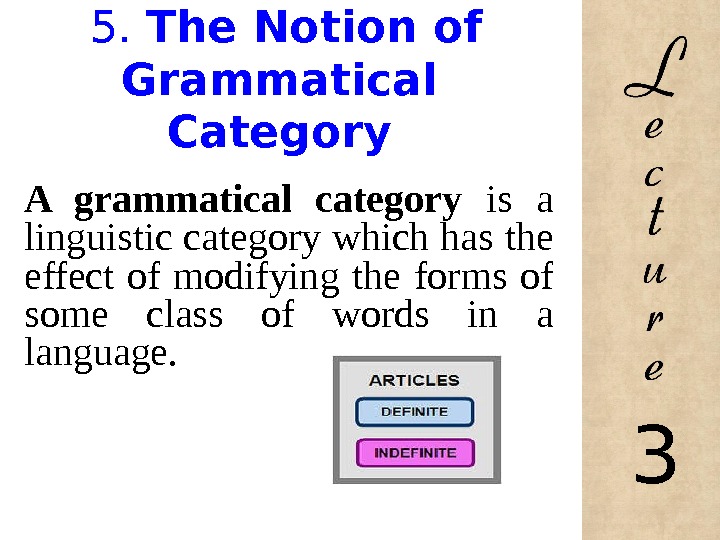


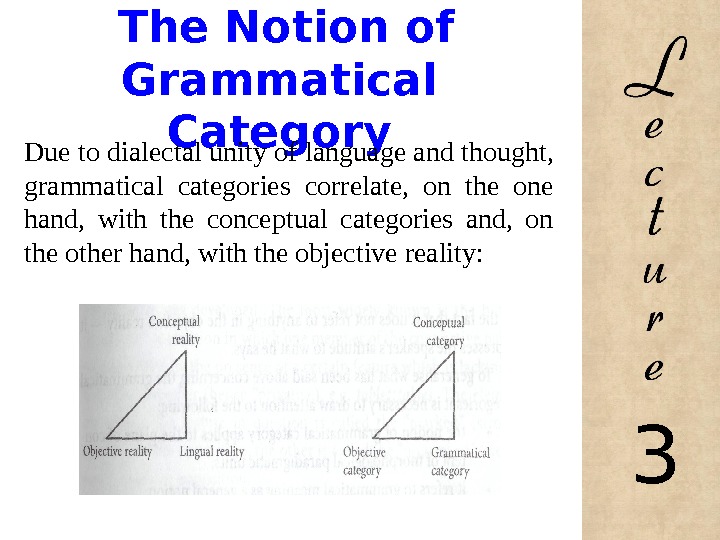
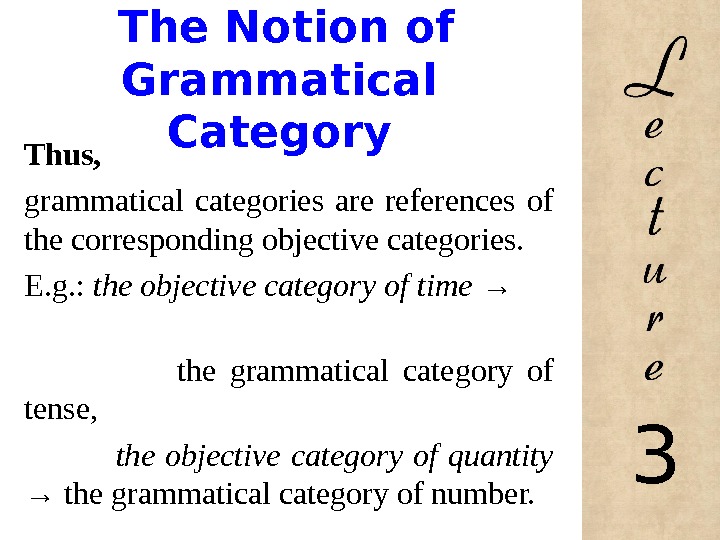
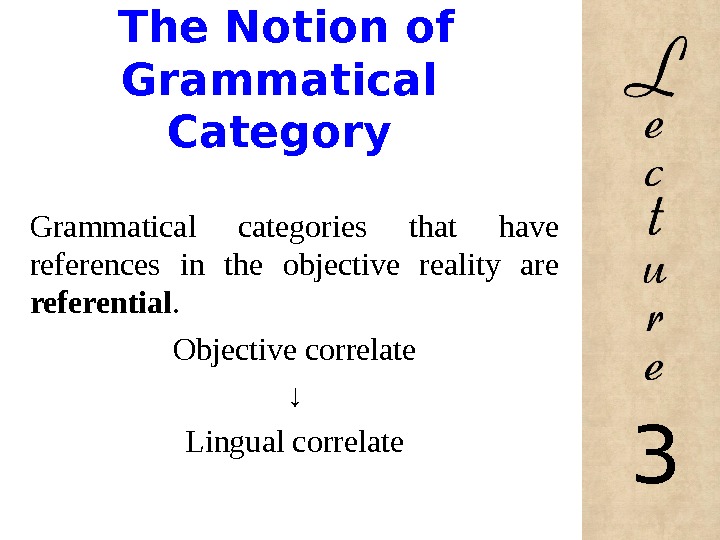

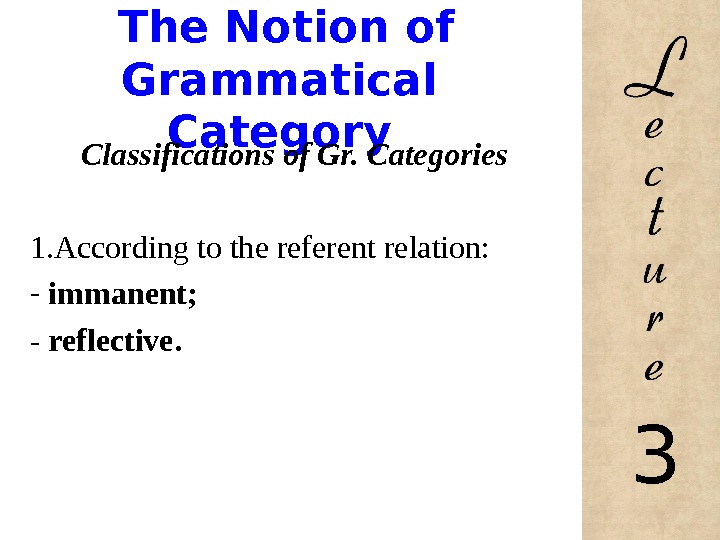
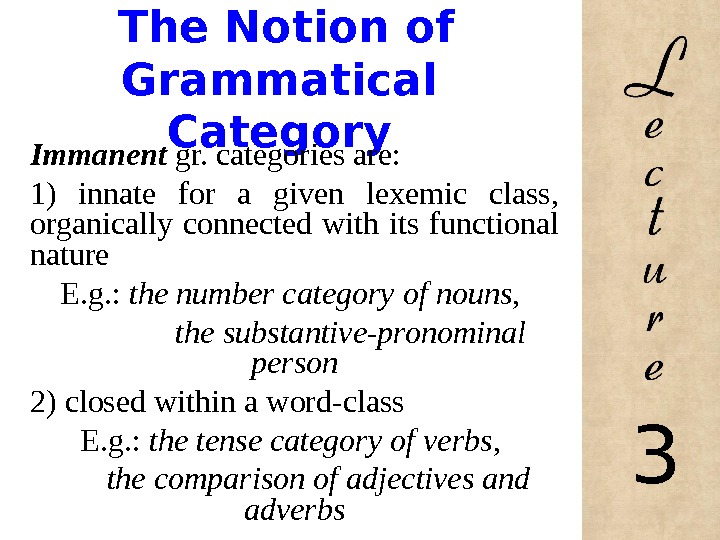
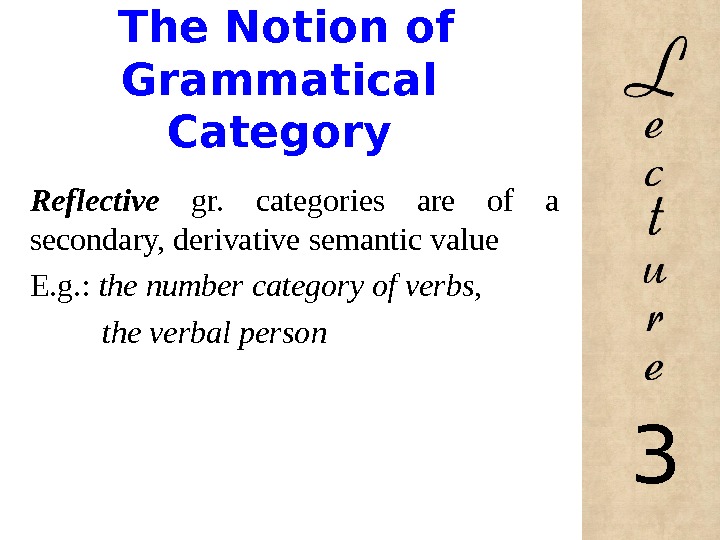

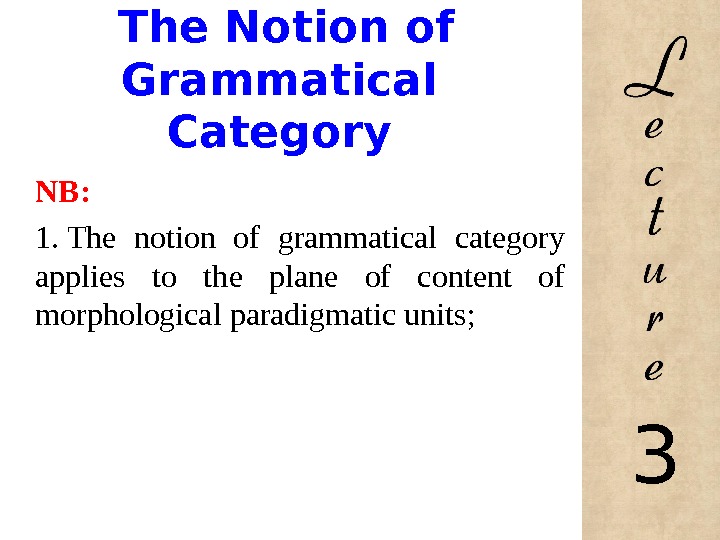
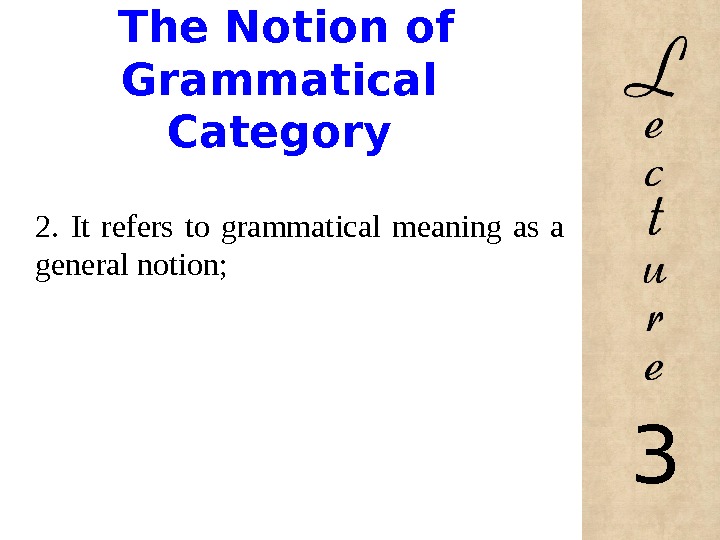

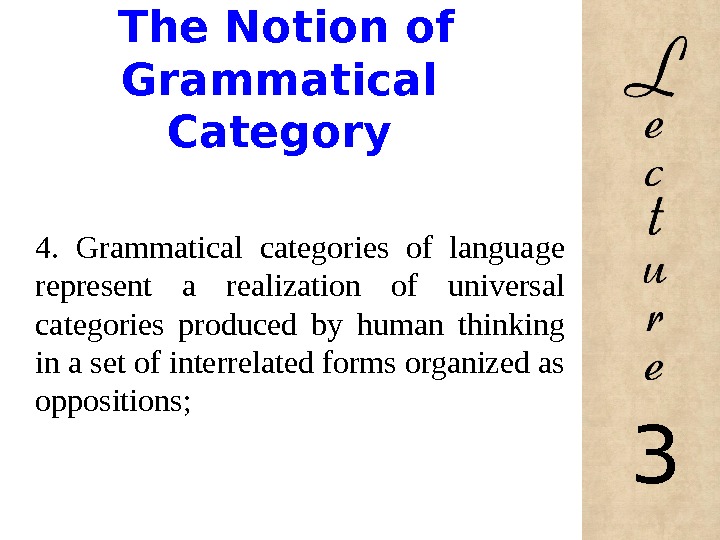

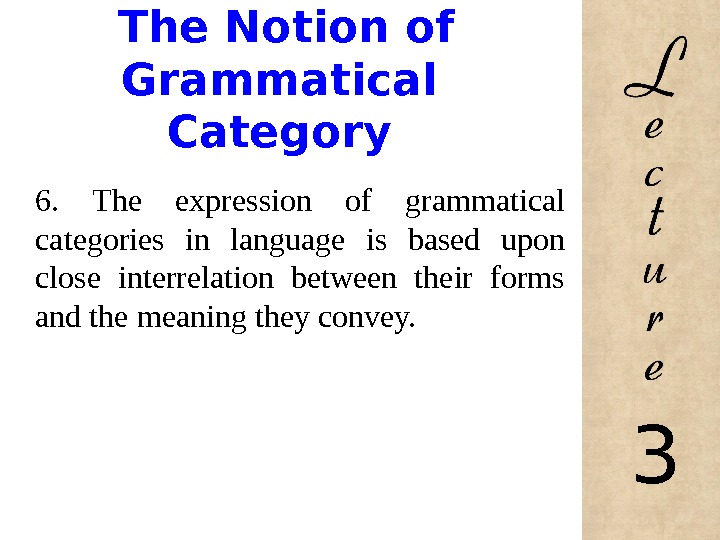
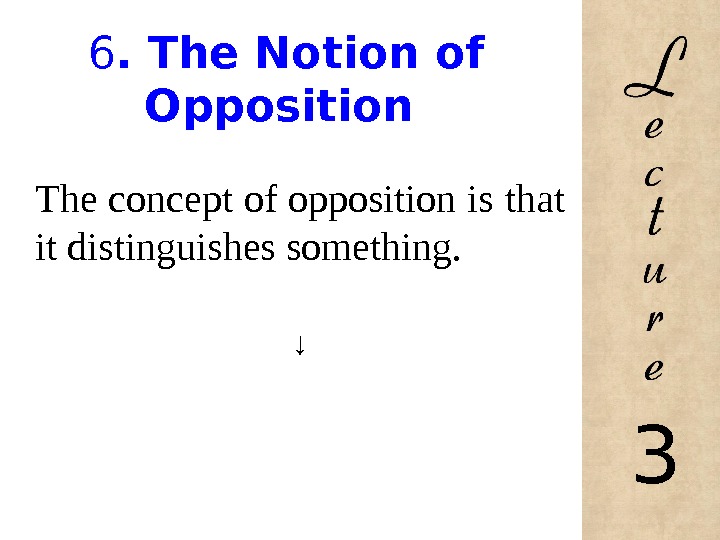
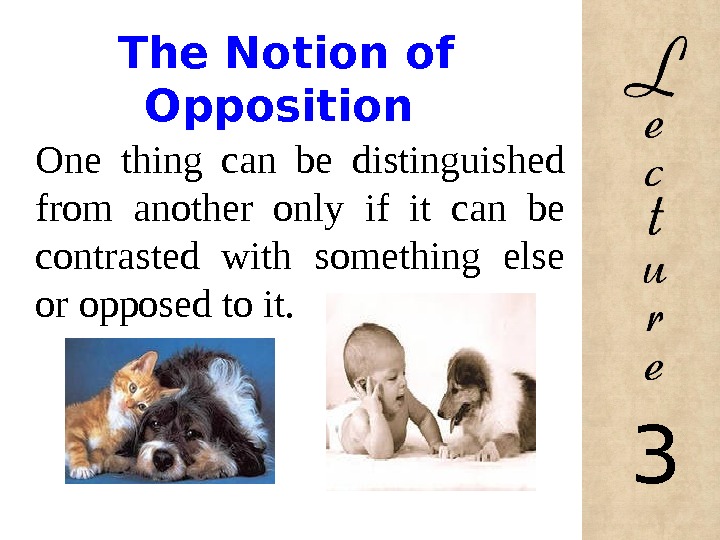
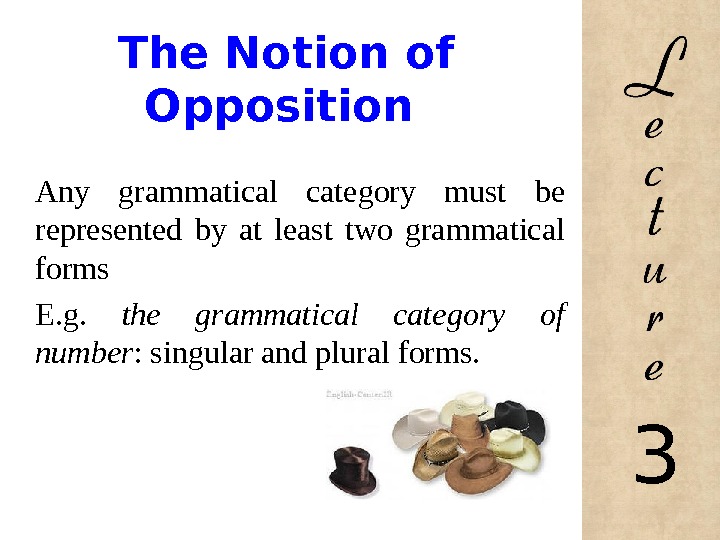
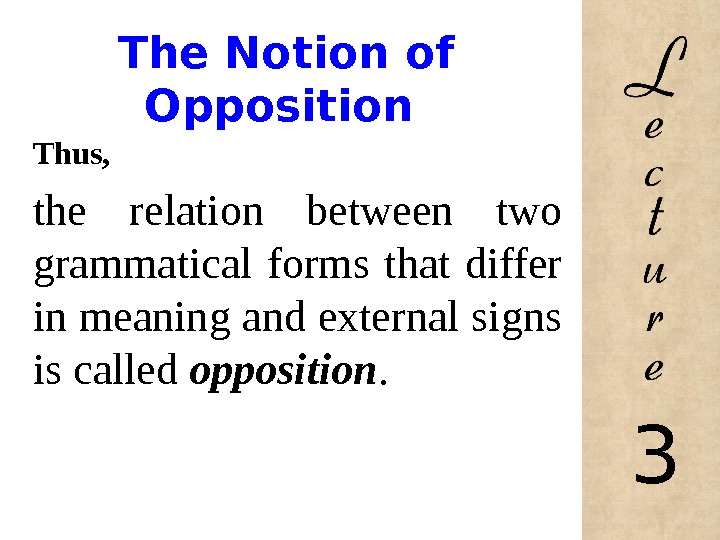

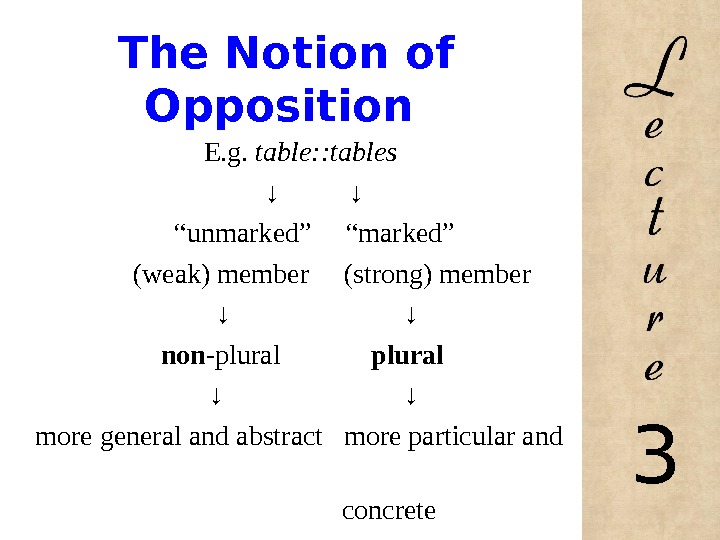
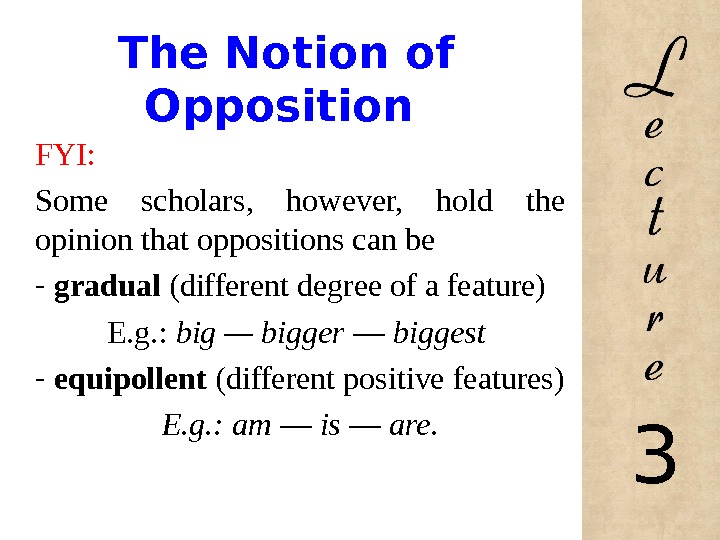
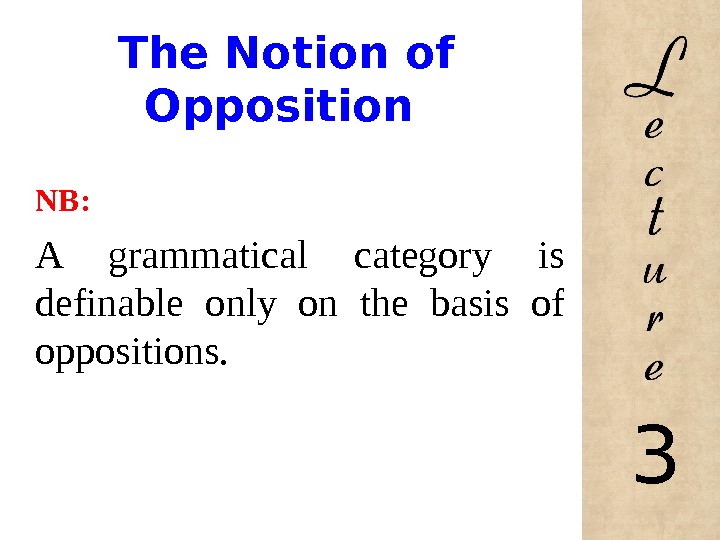
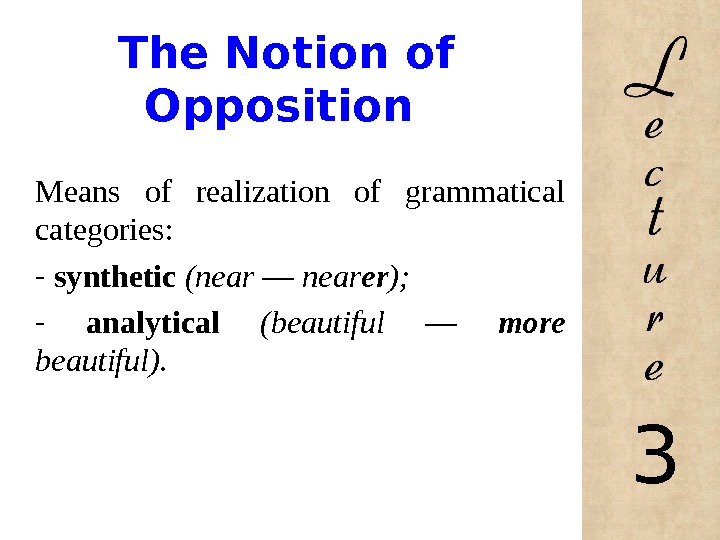
Presentation on theme: «Лексикология как наука о словарном составе языка. Цели и задачи курса. Слово как основная единица лексической системы. Основные способы номинации в языке.»— Presentation transcript:
1
Лексикология как наука о словарном составе языка. Цели и задачи курса. Слово как основная единица лексической системы. Основные способы номинации в языке. Комплексная цель: охарактеризовать предмет изучения лексикологии, ее теоретическое и практическое значение, взаимосвязь с другими дисциплинами, ознакомить с такими понятиями, как синхрония и диахрония в лексикологии, парадигматический и синтагматический подходы, представить теоретические основы изучения словарного состава языка, изложить основные проблемы курса лексикологии современного английского языка. Рассмотреть основные проблемы теории слова: 1) определение слова; 2) мотивированность слова; 3) отличия слова от морфемы и от словосочетания; 4) связь между словами и объектами реальной действительности.
2
Lexicology as a Science. A General Characteristic of the English Vocabulary. What is lexicology? What is language? Describe some general problems of the theory of the word: definition of a word; identity and isolation of words; connections between objects of reality and words; motivation of words. Describe the problem of the diachronic and synchronic approaches in vocabulary system. Describe the notion of lexical system. Describe the theory of opposition. Describe the paradigmatic and syntagmatic relationships of words in Modern English.
3
Word learning LEXICOLOGY general special contrastive historical descriptive 1965 DIDRO and LAMBERT
4
LANGUAGE Nominative Communicative cognitive Objective Social Historical As old as our consciousness
5
Theoretical basis Dialectical materialism Lenin’s theory of reflection Reflection is the general property of matter Reflection is selective
6
Consciousness The highest form of reflection of objective reality Related to objective reality consciousness represents an ideal image of objects constituting this reality
7
Two Approaches to Language Study the synchronic (or descriptive) and the diachronic (or historical) approach the Swiss philologist Ferdinand de Saussure (1857 — 1913) The term “synchronic” is composed of two Greek morphemes syn meaning “together, with” and chronos which denotes “time”. The synchronic approach is concerned with the vocabulary of a language as it exists at a given period of time, e.g. at the present time. The term “diachronic” is composed of the Greek morphemes dia meaning “through” and chronos meaning “time”. the diachronic approach in terms of special lexicology deals with the changes and the development of vocabulary in the course of time.
8
Some General Problems of the Theory of the Word The term word denotes the basic unit of a given language. It is simultaneously a semantic, grammatical and phonological unit. In linguistic literature we find many different definitions of a word. 1) the problem of defining the word; 2) the connection between words and objects of reality; 3) the motivation of a word since every object of reality possesses a lot of features, but only the most important and characteristic of them may become the representative of the object; 4) the problem of isolation of a word, for the borderline between various linguistic units is not always clear; words of different structural types are characterized by inseparability which finds its expression in graphic, morphological and semantic integrity; 5) the problem of identity of word as the word exists in the language in a system of its grammatical forms (morphological and syntactical).
9
The word is a sort of focus for the problems of phonology, lexicology, morphology, syntax and also for some other sciences that have to deal with language and speech, such as philosophy and psychology. There were many attempts to define the word, but all of them are criticized for being incomplete.
10
Any definition of the word is conditioned by the aims and interests of its author. Linguists have tried to define the word syntactiсally, semantically, phonologically and by combining various approaches. H. Sweet defined the word as «the minimum sentence» (syntactic approach). E. Sapir takes into consideration the syntactic and semantic aspects. He defines the word as «one of the smallest completely satisfying bits of isolated ‘meaning’ into which the sentence resolves itself”. French linguist A. Meillet combines the semantic, phonological and grammatical criteria and gives a definition which underlies many definitions suggested both abroad and in our country. «A word is defined by association of a given meaning with a given group of sounds susceptible of a given grammatical employment».
11
INDIVISIBILITY a lion and aliveA lion is a word group and we can insert other words between the article a and the word lion: a dead lion, a beautiful lion. Alive is a word, it is indivisible.
12
The word is a dialectical unity of form and content The system showing a word in all its word-forms is called its paradigm.
13
INTRALINGUISTIC RELATIONS OF WORDS Syntagmatic He got a letter (‘to receive’); He got tired (‘to become’); syntagmatic relations are linear (simultaneous) relationships between words. Paradigmatic the synonymic set: to obtain, to receive, to gain, to acquire, Paradigmatic relations are the relationships that a linguistic unit has with units by which it may be replaced paradigmatic relations are associative (non- simultaneous) relationships between words.
14
MOTIVATION The term motivation is used to denote the relationship existing between the morphemic or phonemic and structural pattern of the word on the one hand, and its meaning on the other There are three main types of motivation: phonetical motivation; morphological motivation; semantic motivation.
15
MOTIVATION The phonetical motivation implies a direct connection between the phonetic structure of the word and its meaning. cuckoo (cf. in Russian кукушка) There is a certain similarity between the sound- form of the word and the sounds the bird produces. The morphological motivation implies a direct connection between the lexical meaning of the component morphemes, the pattern of their arrangement and the meaning of the word. to rethink — the idea of “thinking again”
16
The semantic motivation implies a direct connection between the central and marginal meanings of the word. eyewash has two meanings: 1) a lotion for the eyes (примочка для глаз); 2) something said or done to deceive a person so that he thinks what he sees is good though in fact it is not (cf. in Russian очковтирательство) Semantic motivation is based on the coexistence of direct and figurative meanings within the semantic structure of the word.
17
Лексическое значение и семантическая структура английских слов. Комплексная цель: дать общее представление о природе значения слов, определение семасиологии, раскрыть основные типы лексических значений слова и принципы их классификации, взаимосвязь между значением слова и его сочетаемостью, значением и употреблением. Охарактеризовать понятие полисемия, ее роль в языке и причины этого явления, смысловая структура многозначного слова, историческая изменчивость смысловой структуры слова и ее причины, основные типы семантических изменений слов.
18
Semasiology The branch of lexicology which deals not with every kind of linguistic meaning but with lexical meaning only. Word-meaning is not homogeneous. It is made up of various components. These components are described as types of meaning. The two main types of meaning are the grammatical meaning and the lexical meaning.
19
The grammatical meaning It is an expression in speech of relationship between words the tense meaning in the word-forms of the verbs: asked, thought, walked; the case meaning in the word-forms of various nouns: girl’s, boy’s, night’s; the meaning of plurality which is found in the word-forms of nouns: joys, tables, places.
20
LEXICAL MEANING the realization of the notion by means of definite language system. The word-forms go, goes, went, going, gone possess different grammatical meanings of tense, person, number, but in each form they have one and the same semantic component denoting ‘the process of movement’.
21
The denotational aspect of lexical meaning is the part of lexical meaning which establishes correlation between the name and the object, phenomenon, process or characteristic feature of concrete reality (or thought as such), which is denoted by the given word. The term “denotational” is derived from the English word to denote which means ‘be a sign of, indicate, stand as a name or symbol for’. booklet is ‘a small thin book that gives information about something’.
22
THE CONNOTATIONAL ASPECT the part of meaning which reflects the attitude of the speaker towards what he speaks about. Connotation includes: the emotive charge, e.g. daddy as compared to father, evaluation, which may be positive or negative, e. g. clique (a small group of people who seem unfriendly to other people) as compared to group (a set of people); intensity (or expressiveness), e.g. adore as compared to love; imagery, e.g. to wade — to walk with an effort (through mud, water or anything that makes progress difficult). The figurative use of the word gives rise to another meaning which is based on the same image as the first — to wade through a book.
23
The pragmatic aspect of lexical meaning is the part of meaning, that conveys information on the situation of communication 1)information on the “time and space” relationship of the participants. 2)information on the participants and the given language community. information on the tenor of discourse. information on the register of communication Three main types of the situations of communication are usually singled out: formal, neutral and informal the pragmatic aspect of meaning refers words like cordial, fraternal, anticipate, aid, sanguinary, celestial to the formal register while units like cut it out, to be kidding, hi, stuff ‘are to be used in the informal register..
24
CAUSES OF SEMANTIC CHANGE extra-linguistic by extra-linguistic causes various changes in the life of the speech community are meant, i. e. changes in economic and social structure, changes in scientific concepts. hlaford. Originally the word meant ‘bread- keeper’ («хранитель хлеба»), and later on ‘master, ruler’ («повелитель, лорд»). linguistic. factors acting within the language system
25
NATURE OF SEMANTIC CHANGE There are two kinds of association involved in various semantic changes: similarity of meanings; contiguity of meanings. Similarity of meanings or metaphor may be described as the semantic process of associating two referents, one of which in some way resembles the other. hands of the clock {watch Contiguity of meanings or metonymy may be described as the semantic process of associating two referents one of which makes part of the other or is closely connected with it. mother tongue
26
RESTRICTION OR EXTENSION OF MEANING Restriction of meaning can be illustrated by the semantic development of the word hound which used to denote “dog of any breed” but now denotes only “a dog used in the chase”. If the word with the extended meaning passes from the specialized vocabulary into common use, the result of the semantic change is described as the generalization of meaning.
27
Amelioration of meaning Deterioration (or the pejorative development) of meaning the improvement of the connotational component of meaning. the acquisition by the word of some derogatory emotive charge
28
Polysemy is a phenomenon which has an exceptional importance for the description of a language system and for the solution of practical tasks connected with an adequate understanding of the meaning of a word and its use. A word may have several meanings. Then it is called a polysemantic word. Words having only one meaning are called monosemantic. Of special importance is the fact that polysemy exists only in language, not in speech. The meaning of a word in speech is contextual.

